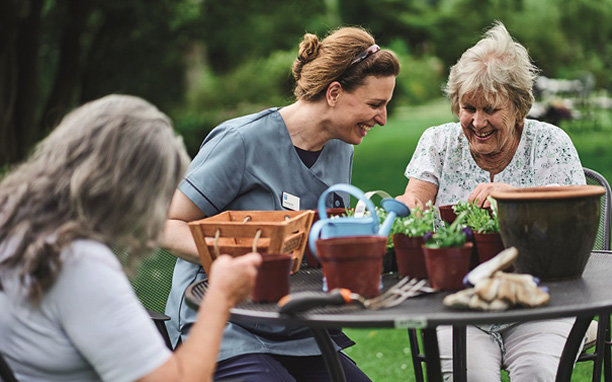Almost half of adults don’t think they’ve made a difference to society in their jobs.

Millions fear they haven’t contributed to the wider world in their career – whether by helping vulnerable people, the local community or the environment.
As such, 45 per cent revealed they feel guilt or shame about what they do for a living simply because they don’t think what they do is ‘vital’ – unlike for instance, being a carer or charity worker.
In a study of 2,000 adults, carried out by Bupa Care Homes, over half said they had considered changing their careers to do something more meaningful.
Meanwhile 47 per cent agreed the past nine months have inspired them to do a job which gives something back.
What’s more, a quarter have already made the leap, leaving behind office jobs, retail roles and more to become fundraisers, teachers and healthcare workers.
Melissa Moore, head of recruitment for Bupa Care Homes said: “This year has really made many think about their role in society and what impact they make on other people’s lives.
“At the same time, it’s shone a light on the people making a difference – from charities to the frontlines of health and social care – so it’s no surprise to see people taking stock of their own careers.
“If you’re thinking of making a change, there’s never been a better time. Sectors like social care are seeing a boom in recruitment, with a big spike in people considering the sector for the first time.”
Those polled also revealed what traits their ideal role would have – with a sense of fulfilment favoured by 54 per cent of people.
Elsewhere, 38 per cent wanted to make a difference to others, while 23 per cent agreed that the opportunity to meet new people was key.
However, the study of 2,000 adults also identified what’s holding people back from making positive changes. For many (44 per cent), lack of time is the biggest hindrance.
Likewise, not knowing how to get involved in such a role (22 per cent), and doubts over whether they’ll be good at it are also factors.
Melissa Moore continued: “Experience isn’t everything, it’s about transferable skills. For example, in our care homes we’ve seen a huge increase in people applying from outside the sector.
“Over the last year we’ve welcomed colleagues from all sorts of sectors, but particularly retail, leisure and tourism. From holiday entertainers to hairdressers, we’ve seen a diverse mix of new joiners.
“Far from being under qualified, they bring great skillsets and new ways of thinking. If you can provide this, employers will snap you up and help you learn on the job.
The study also found that three quarters of people placed a higher importance on job security as a result of the pandemic.
Like many social care providers, Bupa has seen a spike in recruitment as people look to more stable sectors. At its peak, applications rose by some 30% since the beginning of the year.
As a result, the company is currently appointing more than 200 new roles each month, across more than 130 care homes nationwide.
These range from carers and nurses, through to chefs, housekeepers and management.
Outside of people’s careers, researchers found that 54 per cent of people have been making steps to benefit society outside of work.
The most common activities included giving to charity shops (55 per cent), donating to food banks (38 per cent) and checking in on elderly neighbours (26 per cent).
22 per cent of people also donate blood, while one in five undertake challenges to raise money for charity or donate their time at events and fundraisers.
Melissa Moore concludes: “Now more than ever, it’s important to find the ways to end the day with a smile on your face.
“Whether that’s through supporting charities or finding the job that you love, it’s great to see so many people wanting to make a difference.”
About Bupa
Bupa's purpose is helping people live longer, healthier, happier lives and making a better world.
We are an international healthcare company serving over 31 million customers worldwide. With no shareholders, we reinvest profits into providing more and better healthcare for the benefit of current and future customers.
We directly employ around 85,000 people, principally in the UK, Australia, Spain, Chile, Poland, New Zealand, Hong Kong SAR, Turkey, Brazil, Mexico, the US, Middle East and Ireland. We also have associate businesses in Saudi Arabia and India.



